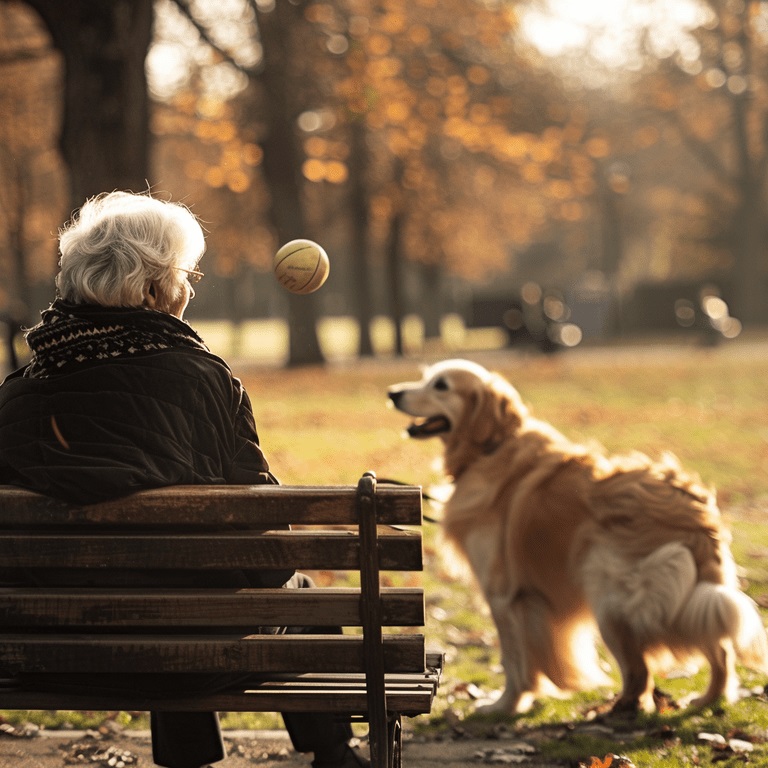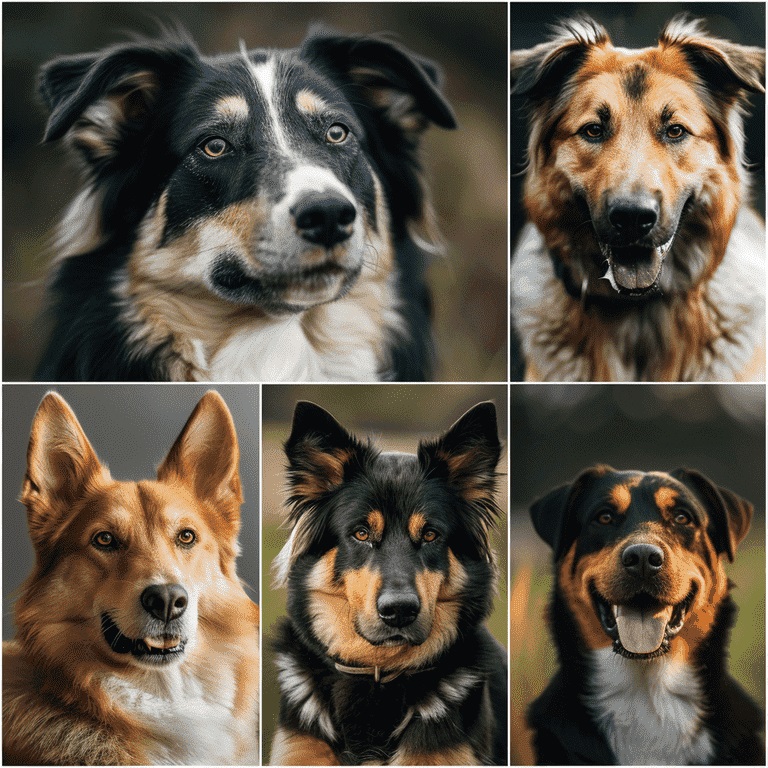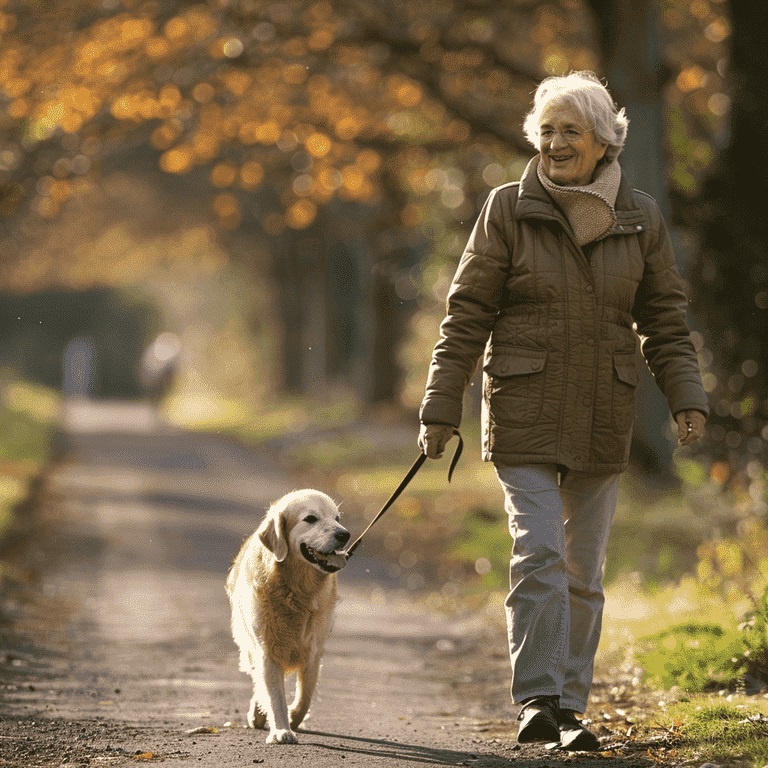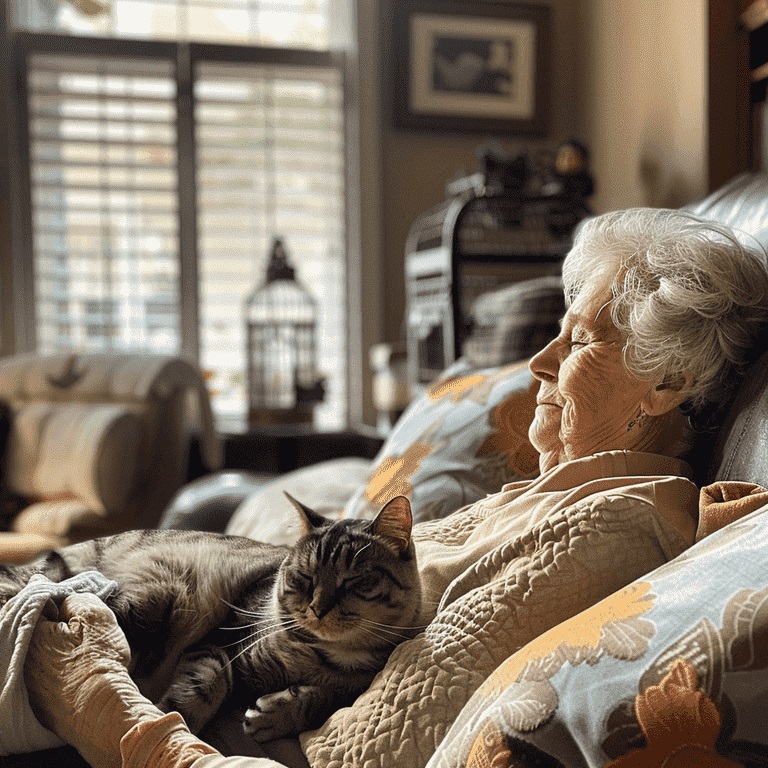Introduction
Choosing the right dog breed is crucial for seniors. They want to enjoy the companionship of a furry friend without overwhelming themselves. This guide explores the traits of certain dog breeds. These traits may not be the best fit for elderly people. You need to find a pet that matches your lifestyle, abilities, and health. This will ensure both you and the pet are happy and well-cared for.

Challenges of high-energy and large breeds for senior pet owners.
Factors That Make Some Breeds Less Suitable for Seniors
Physical Strength and Size
Bigger dogs are harder for seniors. This is because they are physically demanding to handle and care for. These breeds need more space, exercise, and strength to manage. This can be hard for older adults.
Examples of physically demanding breeds:
- Great Dane: Known for their giant size, they can be challenging to manage due to their strength.
- Saint Bernard: Their massive build and strength can make daily handling challenging.
Energy and Activity Levels
High-energy dogs need more time, commitment, and physical ability to manage them. They need regular, tough exercise. Without it, they can become destructive or develop behavior issues.
Examples of high-energy breeds:
- Border Collie: Needs constant mental and physical stimulation.
- Jack Russell Terrier: Small but incredibly energetic, requiring lots of exercise.
Grooming and Care Needs
Some dog breeds must extensive grooming, which can be time-consuming and physically demanding. High-maintenance grooming can strain seniors. They may have limited mobility or health issues.
Examples of high-maintenance grooming breeds:
- Afghan Hound: Known for their long, flowing coats, they require regular, thorough grooming.
- Poodle: Requires regular professional grooming to maintain their coat’s condition.
Temperament and Trainability
Stubborn or very independent breeds can be hard for seniors to train and manage. So, seniors should choose dogs with a temperament suited to peace. They should also be manageable for a senior’s situation.
Examples of breeds with challenging temperaments:
- Chow Chow: Known for their aloofness and stubborn nature.
- Shar Pei: Independent and sometimes standoffish, can be resistant to training.
This section has outlined vital factors. They can make certain breeds less suitable for seniors. It focuses on strength, energy, grooming, and temperament. These factors are critical. They ensure that a pet’s choice matches an older adult’s abilities and lifestyle.

Breeds that may pose challenges for senior owners.
Specific Breeds Not Recommended for Seniors
Siberian Husky
High energy and exercise requirements:
- Siberian Huskies are known for their endurance and need for vigorous activity. They thrive in environments where they can run and explore extensively.
Independent nature and training challenges:
- Huskies are energetic and independent. Training them requires consistency and patience, which can be challenging for seniors.
German Shepherd
Large size and strength:
- As one of the larger breeds, German Shepherds can be overwhelming for seniors due to their size and power.
High energy and need for regular, vigorous exercise:
- These dogs are highly active and require substantial exercise to stay healthy and well-behaved, which might be too demanding for older adults.
Dalmatian
High energy and endurance:
- Dalmatians are highly active and can maintain their playful and energetic nature well into their older years. They need vigorous exercise daily.
Training challenges due to stubbornness:
- Known for their stubborn streak, Dalmatians can be challenging to train, necessitating assertiveness and consistency that may be tough for some seniors.
Australian Shepherd
Extremely high energy and intelligence:
- Australian Shepherds are not only active but also highly intelligent. They need constant mental and physical stimulation to prevent boredom and destructive behavior.
Needs for mental stimulation and physical activity:
- This breed requires engaging activities and regular exercise, making it a challenging pet for seniors who prefer a more relaxed lifestyle.
Rottweiler
Strong build:
- Rottweilers are robust and powerful, making them difficult to manage for those with limited physical strength.
Requires firm training and early socialization:
- They need a firm, experienced hand in training and consistent socialization to develop a well-balanced temperament, which might be demanding for elderly owners.

Ensuring a safe and enjoyable walk for seniors and their pets.
Health Considerations for Seniors with Pets
Potential injuries from handling more significant or more active dogs:
- Strains and falls: Managing a large or active dog can increase the risk of physical injury due to pulling or sudden movements.
- Overexertion: Too much physical activity with a pet can lead to exhaustion or health complications.
Stress and health impacts of dealing with high-maintenance breeds:
- Emotional stress: Struggling to meet the needs of a demanding pet can cause emotional and physical stress.
- Time and energy: The time and energy required to care for high-maintenance dogs can detract from the owner’s ability to care for themselves.

Exploring gentle and low-maintenance pet options for seniors.
Alternative Pet Options for Seniors
Several pet options might suit seniors looking for companionship without high maintenance.
Benefits of lower-energy, smaller breeds:
- Ease of care: Smaller, lower-energy dogs require less physical activity and are easier to manage.
- Companionship: These pets still provide companionship and affection without overwhelming their owners.
Examples of more suitable breeds for seniors:
- Shih Tzu: Known for their friendly nature and manageable size.
- Cavalier King Charles Spaniel: Affectionate and generally content with short walks and many cuddles.
Considering other pets beyond dogs:
- Cats often require less attention and care than dogs, making them a good alternative for seniors.
- Birds: Can offer companionship and entertainment without extensive grooming or exercise.
These sections explain why some dog breeds are hard for seniors. They suggest other options that better fit seniors’ lifestyles and abilities.
Choosing the right pet involves more than just falling in love with a breed’s looks or traits. For seniors, it’s crucial to consider how a dog will fit into their lives. This is especially important as their abilities change with age. This guide has covered many breeds that might pose challenges. These challenges are due to their size, energy, grooming, and temperament.
Recap of the key points discussed:
- Physical strength and size: Larger breeds can be physically demanding and may overwhelm seniors.
- Energy and activity levels: High-energy dogs require more time and physical ability to manage.
- Grooming and care needs: Breeds with extensive grooming needs can be taxing for those with limited mobility or energy.
- Temperament and trainability: Dogs with stubborn or independent personalities may be challenging for seniors to train and control.
- Health considerations: The physical demands of certain breeds could pose injury risks and emotional stress for elderly owners.
Choosing a pet is a big decision. This is especially true for seniors. Picking a breed is key. It should fit one’s abilities, living conditions, and preferences. Some are daunted by the care needs of specific dog breeds. They can consider smaller, lower-energy dogs. Or other pets, like cats or birds, may give better and more fulfilling companionship.
By thinking carefully and understanding their needs and abilities, seniors can choose a pet. It will bring joy and friendship without adding too much burden. This will create a good relationship for both the pet and the owner. It will be full of love and respect.
What should seniors consider when choosing a dog breed?
Seniors should consider their abilities. They should also consider their lifestyle and the health needs of different dog breeds. Choosing a dog that matches their energy levels and strength is essential for a good match.
Are there specific dog breeds that are easier for seniors to handle?
Yes, smaller and less active breeds are more accessible for seniors to handle. The Shih Tzu and Cavalier King Charles Spaniel are often recommended. They are recommended for their small size and gentle nature.
How can seniors manage the challenges of a high-energy dog?
Seniors with high-energy dogs should get regular professional dog walking. They can also ask family members for help to keep the dog well-exercised. Puzzle toys stimulate the dog’s mind and help manage their energy levels.
What are the risks for seniors who choose larger dog breeds?
Due to their strength and size, larger dog breeds can increase the risk of falls and injuries for seniors. When considering a more giant breed, one must be realistic about one’s physical limits.
Can seniors consider pets other than dogs?
Absolutely! Cats can be great companions for seniors. They need less attention and activity than dogs. Birds or fish may also be suitable for seniors looking for lower-maintenance companionship.
What should a senior do if they find a dog’s grooming needs too demanding?
Seniors might look for dog breeds with short coats. These are easier to maintain. Or, they might consider professional grooming services. These services can help with the grooming needs of breeds with longer hair.
How necessary is training for senior dog owners?
Training is crucial as it helps establish clear communication and prevents behavioral issues. Seniors should seek easier training breeds. They should also consider obedience classes. This will ensure their dog is well-behaved and manageable.
Breeds: Specific types of dogs humans have developed to perform various tasks. Different breeds have distinct characteristics, including size, temperament, energy levels, and grooming needs.
Energy Levels are a measure of how active and lively a dog is. Dogs with high energy levels require more exercise and mental stimulation, while those with lower energy levels may be more relaxed and less demanding.
Grooming Needs: Refers to the care required to maintain a dog’s coat, nails, teeth, and overall hygiene. Some breeds require frequent grooming to prevent health issues and keep the coat in good condition.
High-Energy Dogs: Dogs possess a lot of stamina and vigor, requiring significant amounts of physical activity and mental engagement to remain healthy and well-behaved.
Larger Breeds: Dog breeds that are physically bigger and often stronger can pose handling challenges for individuals with limited physical strength or mobility.
Manageable Size: This refers to the size of a pet that is easier for someone to physically handle. It is often important for seniors or those with physical limitations.
Physical Abilities: A person’s physical capabilities can affect their ability to care for and manage a pet, particularly one that is active or large.
Professional Grooming Services: These services are provided by trained professionals who groom pets, handling tasks such as bathing, hair cutting, nail trimming, and ear cleaning. They can be especially helpful for managing pets with extensive grooming needs.
Professional Dog Walking Services: Services individuals or companies offer to walk dogs. This can be particularly beneficial for dog owners who cannot provide sufficient exercise for their pets due to physical limitations or other reasons.
Puzzle Toys: Toys are designed to mentally stimulate dogs by requiring them to solve simple problems to access treats or other rewards. They help manage the behavior and energy levels of high-energy dogs.
Temperament: The nature of a dog can influence how it behaves and reacts in various situations. A gentle temperament, for example, is often preferred for companionship, especially for seniors or those with limited physical capabilities.
Training: The process of teaching a dog to understand and respond to commands and behave appropriately in a domestic environment. It is essential for establishing communication between the dog and the owner and for preventing behavioral issues.
Are you a New York State resident looking for a rewarding way to support your elderly loved one? At Pella Care CDPAS, we specialize in helping families like yours. They get paid to provide essential care. Take advantage of this opportunity to improve your loved one’s life. You will also get the support you deserve. Call us today at 718-908-2273 (or 718-908-CARE). We can tell you more about how you can join our program as a caregiver. Your journey to making a difference in your loved one’s life begins with a phone call!

Recent Comments